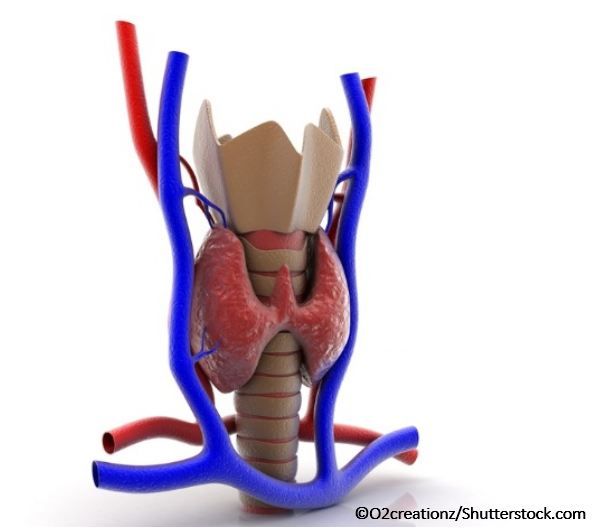5 Questions on Subclinical Hypothyroidism
Sample: Under which circumstances do the recent USPSTF guidelines recommend screening for thyroid dysfunction?

Test your knowledge on subclinical hypothyroidism with the quick, 5-question quiz below.
Question 1.
Please click here for answer and next question.
Answer: C. High TSH, normal T4. Subclinical hypothyroidism is defined as an asymptomatic condition in which the T4 level is normal and TSH exceeds the upper limit of normal, which varies by laboratory, but is commonly defined as 4.5 mIU/L. However, no consensus exists about the appropriate cutoff for TSH in subclinical hypothyroidism. In overt hypothyroidism, the TSH is elevated while T4 is low. In subclinical hyperthyroidism, TSH is low, while T4 and T3 are normal. In overt hyperthyroidism, TSH is low or undetectable while T4 or T3 are elevated. Because TSH values can vary over time, serial measurement is recommended before making a diagnosis.1
Question 2.
Please click here for answer and next question.
Answer: E. None of the above. Controversy exists over whether or not to screen for and treat subclinical hypothyroidism. While recommendations vary about exactly who should be screened, the American Thyroid Association (ATA), American Association of Clinical Endocrinologists (AACE), American Academy of Family Physicians, and the American College of Physicians recommend screening for thyroid dysfunction. The Royal College of Physicians of London and the USPSTF do not recommend routine screening. USPSTF 2015 guidelines state that there is insufficient evidence to recommend routine screening and treatment for thyroid dysfunction in nonpregnant, asymptomatic individuals.1
Question 3.
Please click here for answer and next question.
Answer: D. All of the above. The 2012 recommendations from the ATA/AACE recommend aggressive case finding (screening) for thyroid dysfunction in a wide range of medical conditions, including autoimmune disease, anemia, and adrenal insufficiency. Screening is also recommended for individuals with certain risk factors, such as history of neck radiation or first degree relative with autoimmune thyroid disease. Finally, screening is recommended in individuals with a variety of nonspecific symptoms, such as skin texture changes, constipation, malaise/fatigue, and weight gain.2
Question 4.
Please click here for answer and next question.
Answer: A. No benefit with levothyroxine in older adults with subclinical hypothyroidism. The double-blind, randomized, placebo-controlled TRUST (thyroid hormone therapy for older adults with subclinical hypothyroidism) trial was conducted in 5 European countries, and included 737 adults aged ≥65 years with subclinical hypothyroidism. Participants were randomized to daily levothyroxine (median dose 50 µg) or placebo for 1 year. Hypothyroid symptoms and tiredness were self-reported using standardized questionnaires. Results showed no difference in the mean change from baseline for the hypothyroid symptoms score (p=0.99) or the tiredness score (p=0.77) for levothyroxine vs placebo.3
Question 5.
Answer: A. Low dose of L-thyroxine. In the treatment of subclinical hypothyroidism, the ATA/AACE recommends that the initial dose of L-thyroxine should be lower than usually needed for treating overt hypothyroidism. Though dosage depends on level of TSH elevation, an initial daily dose of 25-75 µg may be considered. Further dosage adjustments may be needed, depending on clinical response and follow-up lab tests.2
References:
1. USPSTF. Final recommendation screening. Thyroid dysfunction: screening. https://www.uspreventiveservicestaskforce.org/Page/Document/RecommendationStatementFinal/thyroid-dysfunction-screening#citation3. Accessed September, 14 2018.
2. Garber JR, Cobin RH, Gharib H, et al. Clinical practice guidelines for hypothyroidism in adults: cosponsored by the American Association of Clinical Endocrinologists and the American Thyroid Association. Thyroid. 2012;22:1200-1235.
3. Stott DJ, Rodondi N, Kearney PM, et al. Thyroid hormone therapy for older adults with subclinical hypothyroidism. N Engl J Med. 2017;376:2534-2544.